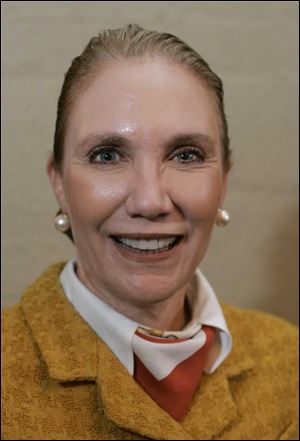
Lucas County Prosecutor urges school aid
3/23/2009
Bates
Lucas County Prosecutor Julia Bates has seen firsthand what can happen to children who aren't in school. Over the years, she said, her office has prosecuted many of them.
That's why Mrs. Bates wants the public to know the findings of a recent study linking violent crime to the state's high school dropout rate. It also cites statistics that link prekindergarten programs to successful high school graduates and calls for support of funding for early education.
In Toledo alone, six murders and 430 assaults could be prevented if the high school graduation rate were to increase 10 percentage points, the study said.
"When you drop out of school, you turn to the street, you turn to gangs, you turn to drugs," Mrs. Bates said. "You end up in police custody. You end up in trouble. You end up in jail."
The study by Fight Crime: Invest in Kids Ohio, an organization of more than 300 law enforcement leaders and crime survivors statewide, showed that nearly 70 percent of all prison inmates nationwide failed to earn a high school diploma.
The report also said that increasing Ohio's graduation rates by 10 percentage points to 86 percent would reduce violent crime by 20 percent. In Ohio, that would mean the prevention of 108 murders and 3,200 assaults each year.
Because high school dropouts are 3 1/2 times more likely than high school graduates to be arrested and more than eight times as likely to be incarcerated, the key to reducing crime is keeping students in school until they complete 12th grade, the group said.
And a way to do that is to invest in early education programs, it said.
"America faces a dropout crisis that poses a threat to community safety," said Jeff Kirsch, vice president of the national organization of Fight Crime: Invest in Kids.
"Research shows that high-quality early learning helps increase graduation rates and reduce crime."
The statistics evolve from studies out of Ypsilanti, Mich., and Chicago, where preschool programs were examined and students were followed as they navigated the education system.
The results showed that those who had attended early education programs were better prepared for kindergarten and so were more likely to succeed through the end of high school.
Armed with the numbers, the group called on Congress to make early education a priority.
U.S. Rep. Marcy Kaptur (D., Toledo) said government is responding.
She said the recently passed recovery bill allocates $1 billion for Head Start and an additional $1.1 billion for early Head Start, plus $100 million for equipment for schools where more than half the children are in school breakfast and lunch programs.
"[That] is most of the schools in the City of Toledo, actually," Miss Kaptur said.
These sorts of responses are exactly what Cyndy Rees wants to hear.
The state director of the Ohio chapter of Fight Crime: Invest in Kids, Ms. Rees said her group looks at research and statistics to see how to keep children away from crime.
And if the figures show that early education means higher graduation rates, that's where the focus needs to be, she said.
"If we can boost high school rates, then we can get on the right track," she said, citing the finding that 70 percent of inmates lack high school diplomas.
Ms. Rees said that Ohio's administration has responded well to calls for early education funding. But even with dedicated money now, a reduction in Ohio's crime rate is a long-term goal, Mr. Kirsch said.
Other aspects of the study include the savings for states when more people stay employed and out of prison. Not only are the costs of incarceration saved but a person who is a working member of the community is adding to the tax base.
If Ohio could raise male graduation rates by 10 percentage points, $465 million would be saved statewide each year, including almost $252 million in reduced crime costs alone, the study said.
Mrs. Bates said that although she did not take part in conducting the study of education and crime rates, she believes the numbers.
Saying that the cycle needs to be broken, she applauded efforts to get children as young as 3 on the right track.
"They say an ounce of prevention is worth a pound of the cure," she said. "Surely in my business that is true."
Contact Erica Blake at:
eblake@theblade.com
or 419-213-2134.